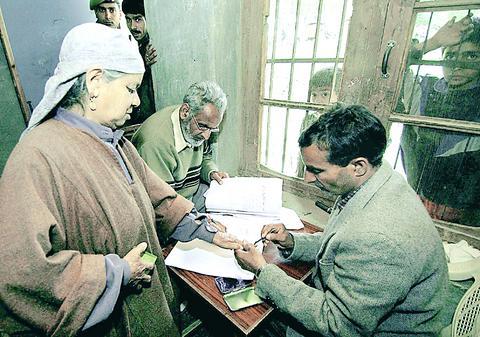Indians braved attacks by separatists and communists as they started voting yesterday in parliamentary elections expected to return Prime Minister Atal Bihari Vajpayee's governing coalition to power for another five years. At least 11 people were killed and 18 injured in the election-day violence.
The massive polls in the world's largest democracy, with more than 660 million registered voters, will be staggered in five phases over three weeks ending May 10, with vote-counting starting three days later.

PHOTO: AFP
Vajpayee's National Democratic Alliance headed into the elections with a booming economy likely to grow more than 8 percent this year and prospects for peace with nuclear rival Pakistan at their highest level in years.
A major issue for peace talks with Pakistan -- which were to resume after the elections -- is the two nations' conflicting claims to Kashmir, which is divided between them.
Militants opposed to India's control over portions of Kashmir were blamed for fatally shooting a paramilitary soldier guarding a polling station and a separate bomb attack in the region that wounded six civilians, including two poll workers.
Islamic militants say the elections legitimize what they see as India's occupation of the Himalayan region, and have threatened attacks on anyone participating in the polls.
A car filled with Indian journalists and human rights activists on their way to monitor polling stations exploded when it ran over a land mine in Kashmir. The driver and a human rights activist -- Asiya Geelani of the Association of Parents of Disappeared Persons -- were killed and four others were wounded.
More than 65,000 people have been killed and some 8,000 people have disappeared in Kashmir since an insurgency began in 1989 by Islamic militants fighting for the enclave's independence.
Maoist rebels also have ordered an election boycott in the isolated northeastern states of Jharkhand and Bihar.

MAKING WAVES: China’s maritime militia could become a nontraditional threat in war, clogging up shipping lanes to prevent US or Japanese intervention, a report said About 1,900 Chinese ships flying flags of convenience and fishing vessels that participated in China’s military exercises around Taiwan last month and in January last year have been listed for monitoring, Coast Guard Administration (CGA) Deputy Director-General Hsieh Ching-chin (謝慶欽) said yesterday. Following amendments to the Commercial Port Act (商港法) and the Law of Ships (船舶法) last month, the CGA can designate possible berthing areas or deny ports of call for vessels suspected of loitering around areas where undersea cables can be accessed, Oceans Affairs Council Minister Kuan Bi-ling (管碧玲) said. The list of suspected ships, originally 300, had risen to about

DAREDEVIL: Honnold said it had always been a dream of his to climb Taipei 101, while a Netflix producer said the skyscraper was ‘a real icon of this country’ US climber Alex Honnold yesterday took on Taiwan’s tallest building, becoming the first person to scale Taipei 101 without a rope, harness or safety net. Hundreds of spectators gathered at the base of the 101-story skyscraper to watch Honnold, 40, embark on his daredevil feat, which was also broadcast live on Netflix. Dressed in a red T-shirt and yellow custom-made climbing shoes, Honnold swiftly moved up the southeast face of the glass and steel building. At one point, he stepped onto a platform midway up to wave down at fans and onlookers who were taking photos. People watching from inside

Japan’s strategic alliance with the US would collapse if Tokyo were to turn away from a conflict in Taiwan, Japanese Prime Minister Sanae Takaichi said yesterday, but distanced herself from previous comments that suggested a possible military response in such an event. Takaichi expressed her latest views on a nationally broadcast TV program late on Monday, where an opposition party leader criticized her for igniting tensions with China with the earlier remarks. Ties between Japan and China have sunk to the worst level in years after Takaichi said in November that a hypothetical Chinese attack on Taiwan could bring about a Japanese

The WHO ignored early COVID-19 warnings from Taiwan, US Deputy Secretary of Health and Human Services Jim O’Neill said on Friday, as part of justification for Washington withdrawing from the global health body. US Secretary of State Marco Rubio on Thursday said that the US was pulling out of the UN agency, as it failed to fulfill its responsibilities during the COVID-19 pandemic. The WHO “ignored early COVID warnings from Taiwan in 2019 by pretending Taiwan did not exist, O’Neill wrote on X on Friday, Taiwan time. “It ignored rigorous science and promoted lockdowns.” The US will “continue international coordination on infectious